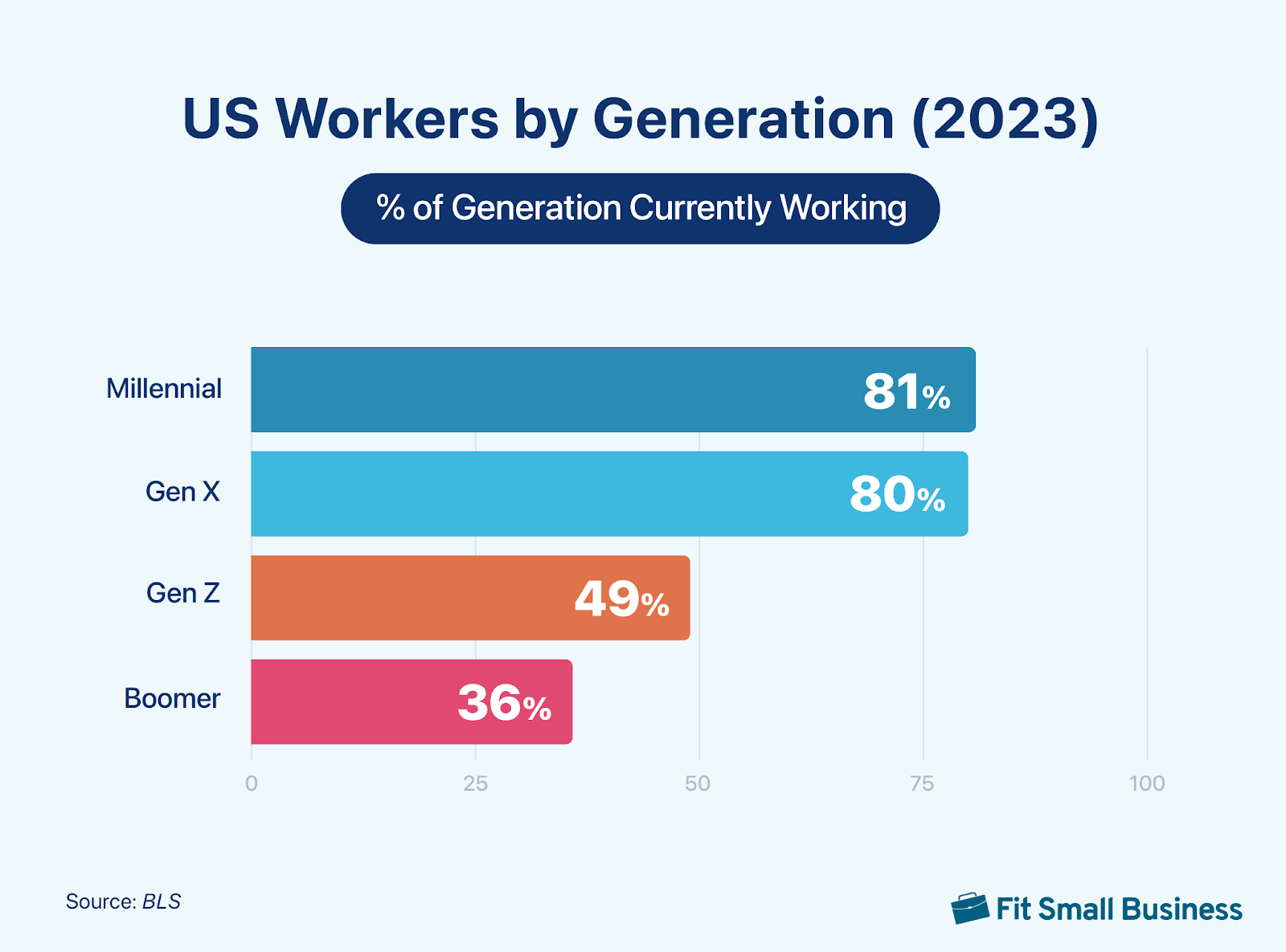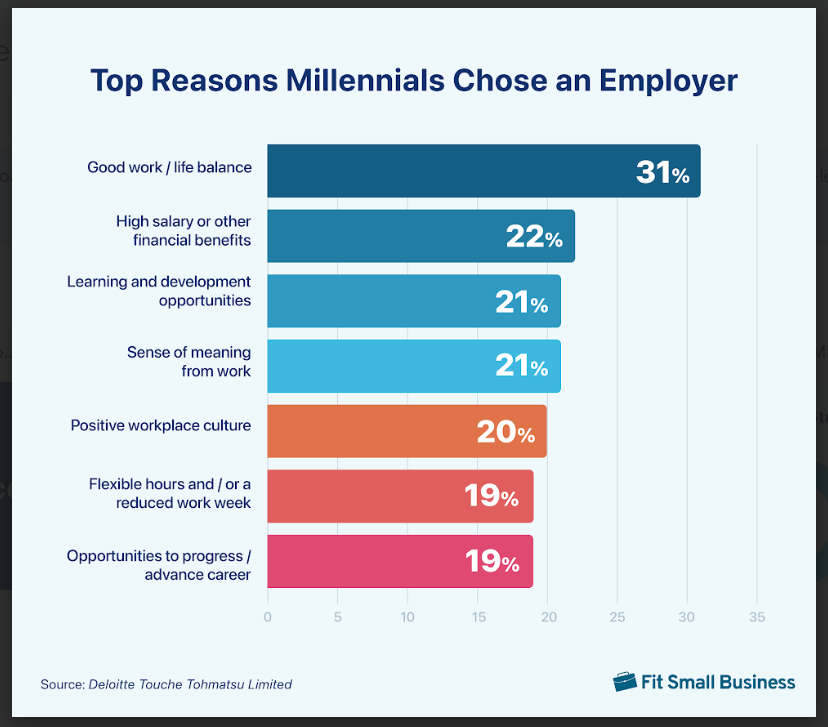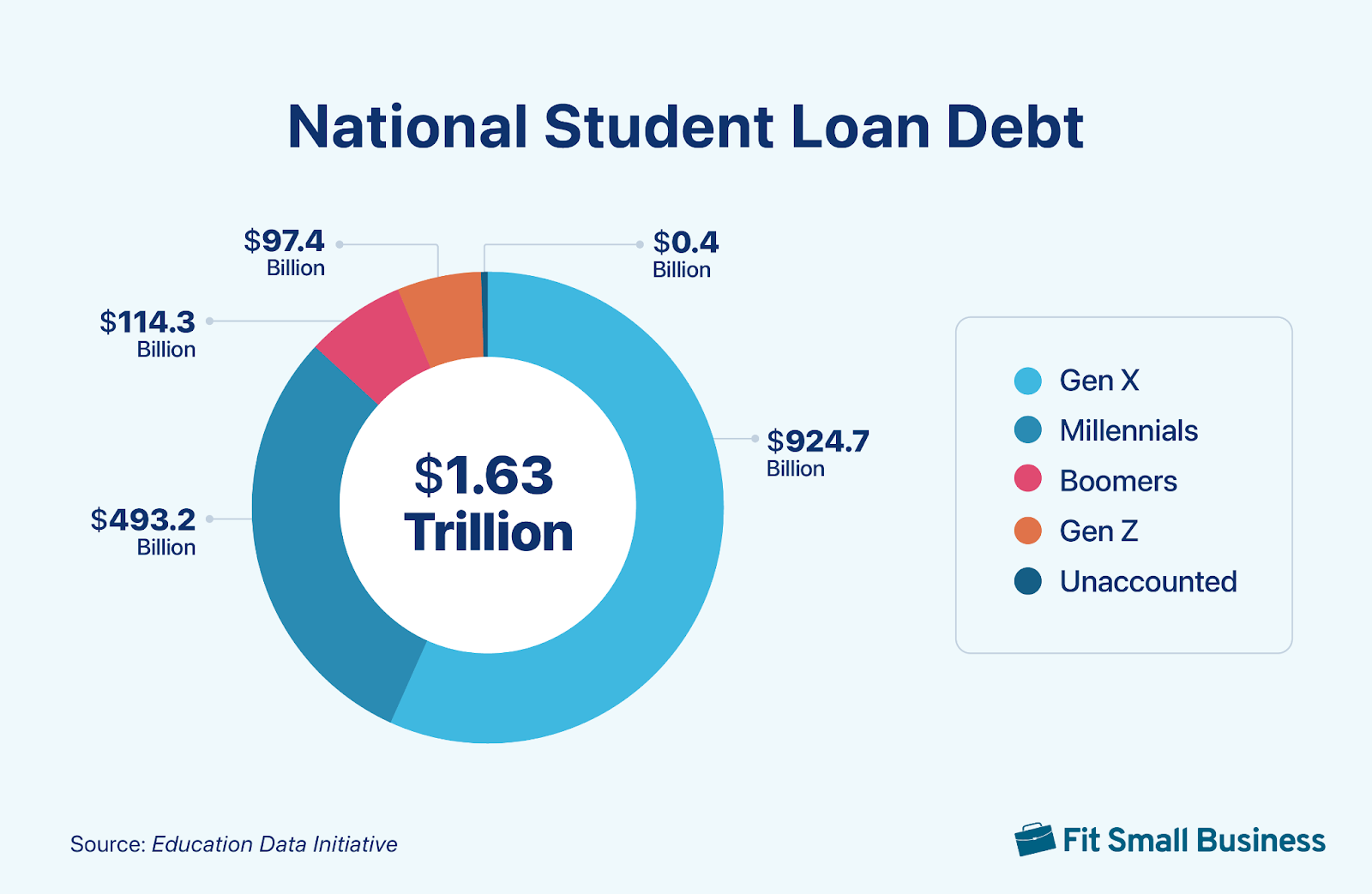Millennials (born between 1981 and 1996) are sometimes criticized as a lazy generation, but it may be that they simply recognize outdated working methods. As the largest share of the workforce today, it’s important for business leaders to pay close attention to what millennials want and need to be successful.
Key Takeaways:
- Pay is the No. 1 reason millennials change jobs.
- Growth opportunities, creativity, and collaboration are key to keeping millennials satisfied and engaged.
- Millennials value work-life balance and a flexible work environment.
Below, we outline some statistics on millennials in the workforce and break them down into categories for easy digestion.
Generational and Demographic Statistics
Millennials currently make up the largest generation in the workforce, accounting for over one-third of all employees. They are often tech-savvy and socially conscious individuals who value flexibility in their work environments.
1. Millennials outnumber all other generations in the workforce
According to the Bureau of Labor and Statistics, 81% of millennials (ages 28 and 43) are currently working. This is much higher than Gen Z (49%) and marginally higher than the recent leader, Gen X (80%). This stat shows that Gen X and boomer workers are starting to leave the workforce as Gen Z are just starting to enter the workforce. Millennials are currently the largest population of workers.
(BLS)

2. About 75% of millennial women are employed
Compared to almost 88% of employed millennial men, for women between the ages of 28 and 43, only 75% are currently working. Contributing to this is the fact that millennials are the largest group that currently become pregnant—and many women may stay home to raise their families. Providing an excellent work-life balance, such as flexible schedules, remote work options, and paid time off policies, can pave the way for females to return to the workforce.
(BLS)
Employee Engagement Statistics
Since millennials make up a significant portion of the workforce, engaging them is key to motivating and retaining them. Engaged employees are productive employees. And, millennials who do not feel engaged tend to find other opportunities.
3. 55% of millennials are disengaged at work
Millennials are the least engaged segment of today’s workforce. Over half of millennial workers are disengaged, leading to lower productivity and higher turnover. Employee engagement ideas, such as increased learning, mentorship programs, and culture committees, can lead to a more engaged workforce.
(Gallup)
4. 92% of millennials are considering changing jobs
According to Forbes, younger workers (including millennials) have a strong entrepreneurial spirit, which causes them to change jobs for a variety of reasons. This is attributed to their work preferences, career growth opportunities, and changes in the job market landscape. Employers should be aware of these trends and consider strategies to retain and attract talent.
(Forbes)
5. 49% of millennials prefer working remotely
If companies want to know how to engage millennial workers, give them the option to work remotely and train their managers to be effective. Remote work could be the biggest driver in millennial employee engagement with 49% of them (the highest among all generations) preferring to work remotely. Along with that is having a strong manager who keeps them informed, communicates effectively, and doesn’t micromanage.
(Joblist)
Employee Retention Statistics
Employee retention statistics show that millennials are more likely to switch jobs compared to other generations. This could be attributed to wanting better career opportunities, work-life balance, or feeling undervalued in their current role. Providing training programs, mentorship opportunities, and clear pathways for advancement can help keep millennials engaged and loyal to your company.
6. Pay is the No. 1 reason millennials leave jobs
As a result of financial anxiety, pay is the number one reason millennials left their jobs within the last several years. However, when choosing jobs, good work-life balance (31%) and learning and development opportunities (21%) are their other top priorities.
(Deloitte)

7. Millennials are the job-hopping generation
A Gallup poll found that more than 20% of millennials had changed jobs within the past year (a much higher percentage than non-millennials), earning them the job-hopping generation nickname. They’re not just job hopping for more money. They’re also doing it for better flexibility and to join an organization that does more meaningful work.
(Gallup)
Companies typically spend more on recruiting than employee retention, even though the latter is a better investment.
8. 80% of millennials & Gen Z think it’s OK to quit a new job if it’s not what they expected
Millennials expect the employer-employee relationship to be a two-way street. If a worker gets into a new position that’s not what was promised, 80% of both millennials and Gen Z agree that it’s acceptable to leave a new job in the first six months. The Muse calls this “shift shock,” and 41% of them would give a new job only two to six months to get better before leaving.
(The Muse)
9. 84% of millennials want to work remotely
While just over half of all workers said they would switch jobs for a remote or hybrid opportunity, 84% of millennials said they would. Remote work or hybrid options are crucial to attracting and retaining millennials in the workplace. And, over half of workers (56%) would switch to a remote or hybrid job to have more flexibility.
(Axios)
Productivity Statistics
Millennials are constantly seeking ways to optimize their time and tasks. Surprisingly, even though statistics show they feel distracted at work, millennials are more productive than previous generations.
10. Millennials believe reduced hours equals increased productivity
Millennials want to use their time wisely, and while a 4-day work week means completing 100% of the work in 80% of the time, 63% are in favor of it. Additionally, they feel they would be more productive (46% more productive) with a shorter workweek. This lends to their desire for greater flexibility in the workplace.
(Newsweek)
11. Only 34% of millennials are satisfied with their work/life balance
Despite working just as much, if not more, than other generations, less than half of millennials are satisfied with their work/life balance. This shows a significant dissatisfaction with how their work stacks up with their life balance, suggesting they feel their careers do not align with their goals.
(Deloitte)
12. The average age of a manager is 30, which is the middle age range of millennials
For millennials, they found the only way to earn more money and advance their careers was to move into people management positions, even if that’s not really what they want to do. Creating growth plans for each position in a company can be a great way to incentivize employees to stick around while showing them exactly where they can go within your organization.
(KornFerry)
Financial Statistics
As the largest generation navigates complex financial decisions, understanding trends can provide valuable insights into how they are shaping the future of wealth management and investing strategies.
13. Millennials own approximately 9% of the country’s wealth
Millennials earn more money, adjusted for inflation, than boomers. That’s the end of the good news. At age 40, boomers owned about 21% of the country’s wealth, mostly through real estate. Today, partly because millennials can’t afford real estate at the same rates, millennials at age 40 only own about 9% of the country’s wealth. Boomers still top the charts today at almost 52%.
(Federal Reserve)
14. 61% of millennials have a side hustle
Most millennials need a side hustle. With stagnant wages and ever-rising living costs, millennials are forced to explore other ways to earn money. And, they aren’t the only ones, 22% of boomers, 36% of Gen Xers, and 59% of Gen Zers all have a side job.
(Zapier)
15. Millennials hold over 30% of student loan debt
Carrying an average balance of just under $40,000 of student loan debt, millennials hold over 30% of the total outstanding student loan debt in the US. As a result of this, combined with other economic factors, millennials are understandably concerned about their financial security and future.
(Education Data Initiative)

16. 34% of companies offer student loan repayment assistance
Company benefits are important to all workers and can help set a business apart from the competition. Student loan repayment assistance is a growing benefit offered by companies to help younger workers shoulder the massive costs of secondary education. While only 8% of companies offered this benefit in previous years, that average has risen to 34% today.
(EBRI)
Employee Well-being Statistics
Studies show that employee well-being is a top priority for millennials in the workforce today. Millennials who feel their well-being is cared for by their employer are more likely to be engaged and productive at work.
17. 35% of millennials feel stressed all or most of the time
Multiple studies show that workers are increasingly aware of their mental health and the stress work places on them. Financial concerns and family welfare are among the top stressors for millennials. Companies that address these issues by offering competitive wages and flexible work schedules are more likely to retain millennials.
(Deloitte)
18. Cost of living is the biggest concern for millennials
Forty-seven percent of millennials cited their long-term financial future as a primary driver of work-related stress. They fear not being able to afford housing, food, and other basic needs.
(Deloitte)
19. 15% of millennials don’t find their jobs fulfilling or meaningful
Workers are seeking fulfillment in their jobs—and many aren’t getting it, wishing they’d chosen a different career path. However, companies can help these workers by implementing development programs to help workers shift their skills into something they prefer and are excited about. This is a win-win.
(Deloitte)
20. Millennials expect employers to care about their well-being
Millennials expect their employers to care about and for their well-being. Statistics show that only 30% of workers feel that current levels of support are adequate. You can show your employees you care in many ways, from inclusive workplaces to flexible working arrangements.
(HRO Today)
Millennials in the Workplace Frequently Asked Questions (FAQs)
They are known to get bored easily and crave growth, so be sure to offer learning and development opportunities. They also want work-life balance, which may mean you need to offer remote work or flexible schedules.
Be sure to create strong relationships between management and millennials. They thrive on knowing they are cared for as a person and not just an employee. Connect with them in person, if possible, or virtually, and be certain to ask about their life, their goals, and how they are feeling.
When training millennials, don’t rely on traditional training methods. Instead, get creative. Some good training examples include microlearning, team-bonding activities, gamification, and mentorships.
Bottom Line
Millennials have often been criticized for their perceived lack of commitment to the workplace and lack of work ethic compared to older generations. However, these criticisms may be unfounded, as recent statistics show that millennials are highly dedicated to their careers and will put in the effort to succeed.
As business leaders, it is important to pay attention to the needs and preferences of this generation. Successfully working with millennials entails understanding what drives them and adapting your strategies accordingly. This will help them succeed in the workplace and ensure the continued success of your company.
Resources: BLS, Gallup, LinkedIn, Deloitte, The Muse, Gallup, Axios, Zapier, Federal Reserve, Education Data Initiative, EBRI, Newsweek, Joblist, KornFerry, Forbes, HRO Today